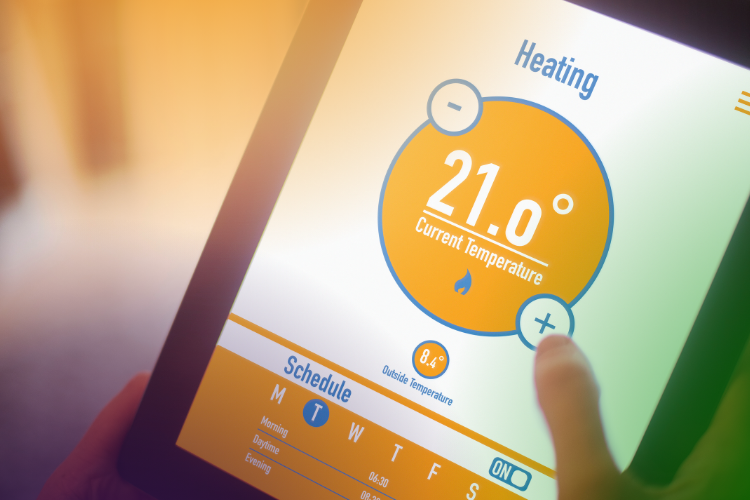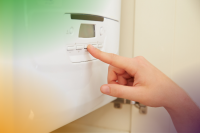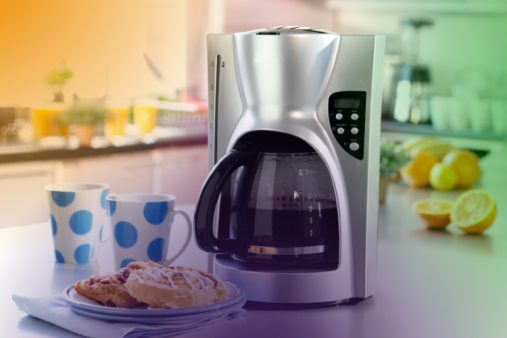Smart heating explained
Smart heating has been the big story in domestic heating over the last few years. It’s a term which most of us have heard, but do you really understand what smart heating is all about, and how it works? If not, you’re not alone.
What is Smart Heating?
Smart heating is a thermostat that allows you to control and customise your heating remotely from your smartphone, tablet, or computer. If you've got a hot water tank you can control that too.
It’s perhaps easier to say what smart heating isn’t. It isn’t some fancy new method of producing heat for our homes, and has nothing to do with renewable energy or going green. Smart heating also shouldn’t be confused with smart meters, which send your meter readings digitally to your energy provider rather than you physically taking readings and sending them in.
Smart Heating gives you more control over your heating
Smart heating is all about giving you more control over how you manage your heating in the home, by making it digital. Although each system is different, they all work in essentially the same way, by giving you an app on your phone which you can then use to control what’s going on at home. If you’re going to be late home, set the heating to come on as you’re leaving the office rather than spending money on heating an empty house.
How Smart Heating works
As with other household gadgets which are labelled “smart”, smart heating relies on the internet to make it work. With a standard non-smart heating system, you either control the heating coming on and off directly on the boiler, or on a small control panel somewhere on the wall of your house. A smart heating system allows you to control your heating online, usually from an app on your mobile phone, but you can also take control through a website. Many can also be hooked up to a digital home assistant such as Alexa, Echo or Cortana which allows you to ask the device to set your heating to a specific temperature, or switch it off altogether.
Most smart heating apps and packages will work with most brands of boilers, but you should do your homework before buying any smart heating system. Take a note of the make and model of your boiler, and check on the company’s website to ensure compatibility. Although smart heating systems will work with most combi boilers, oil fired central heating and electric boilers, they can’t be used with storage heater systems or heat pumps.
Geofencing and Smart Heating
One of the features which is often advertised with smart heating is geofencing. This is a way of the app drawing a virtual boundary around your house and garden. Using your smartphone’s GPS data, the smart heating system knows whether you’re at home, or outside the pre-determined boundary. Apps use this data to send you reminders when you leave the house and the heating is still on, asking whether you want to switch it off or not. This is great if you’re a forgetful sort who lives alone. Not so useful when you are leaving the house to go to work in the morning when the rest of the family is still getting up and ready for work and school. Usually, apps will give the option to disable the reminders if you find them intrusive.
Smart Heating – What’s available and how much will it cost?
There are several major players in the UK smart heating market, so you have plenty to choose from. The main options are:
Hive – this was one of the first systems on the market, and was developed by British Gas. The company is always running special offers through their website and will not only supply the smart thermometer kit, but also extras like radiator valves or energy saving lightbulbs. A basic kit will cost around £180. A calculator on the website will help you work out what cost savings you can expect.
Nest – A Google brand. As well as the smart thermometers to allow you to control your heating, Nest offers additional digital home products such as security cameras. It’s slightly more expensive than Hive, but has more adaptability in that you can monitor security cameras in the house, or who’s ringing the doorbell all from the same app.
Tado – A German brand which works with a wide range of boilers. Their system allows you to control heating both manually and through the app, and claims that the system, costing around £200, will pay for itself in the first year.
Will I save money with Smart Heating?
Unless you’re a gadget-junkie who has to have the latest home technology irrespective of cost, then the main reason for considering smart heating is to save cost on soaring energy bills. Simply fitting a smart heating system and then carrying on using your heating as you always have done will not save you any money on your heating bills. A smart heating system isn’t anything to do with the price you are billed for your energy; it’s more about using your energy smarter and without waste.
The people who will make most savings from installing smart heating systems are those who have no controls whatsoever on their heating at present – so it’s either completely off, or on full blast. Any system which lets homeowners adjust the temperature in each individual room is going to have an impact on heating bills. However, there are other ways to go about this before investing in a whole new smart heating system. Radiator valves can be bought for just a couple of pounds and can be used to control heating in each room. They are easy to install too, and for the average house this is probably a better investment than leaping straight to a smart heating system which will require you to install valves as well.
Whether you save money by installing smart heating will also depend in a large extent on your lifestyle. If you have a routine which doesn’t change much over the year in terms of when you leave the house in the morning or come home at night, then you can programme the boiler to switch on and off in line with your regular pattern. If you’re at home during the day then you are there to switch the heating off if you’re too warm, or boost it when you feel chilly. Smart heating systems are therefore of maximum benefit for people who don’t have a regular work pattern, or who regularly have to stay at work late or leave early. Those people may well save money on their heating bills by managing their heating from their phone.
Smart heating might also help save money in the event of a very cold snap. Most apps have some system for monitoring the temperature outside, and if the forecasters are predicting a very cold night, they can trigger the heating to come on and prevent your pipes from freezing. Faced with a bill for thousands of pounds for flood damage after your pipes have burst, a smart heating system appears to be a good investment. There are however other ways of preventing burst pipes which could be far more cost-effective.
Other ways of cutting heating bills
Smart heating systems are often marketed as the answer to all of your heating problems, and the best way to take control of what you’re spending. That’s partly true, but there are lots of other things you can do to try to reduce your costs without spending upwards of £200 on a smart heating system. Perhaps the most important thing you can ever do is to switch your energy supplier regularly. There is little incentive to remain with the same provider of gas and electricity year after year, and everything to gain from switching. Use a price comparison website to see which company is offering the most competitive rates given your location and area, and switch supplier at the end of each contract. This tactic alone should save you considerable sums on your heating bills, without the need to invest in a smart heating system.
There is an argument that having a smart heating system makes you more energy efficient in general. Just like having a smart meter which displays exactly how much you’re using at all times, having an app on your phone is a visual reminder to switch the heating off, or turn the thermostat down by a few degrees. Many apps will give suggestions about how to use less energy, and demonstrate the potential savings by switching the heating off an hour earlier, of by turning the thermostat down by a degree or two.
The verdict on Smart Heating
If you’re interested in technology in general, and turning you house digital, then smart heating might be a useful way of addressing energy consumption and reducing bills. However, it’s really only something worth considering when you’ve already tackled your insulation, switched energy suppliers, fitted valves on the radiators and made sure your boiler is running efficiently. As smart heating technology becomes more commonplace, cheaper alternatives may emerge to the main market players. It might therefore be worth holding off for a year to see how the market develops.








